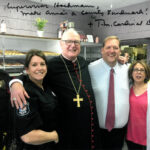At this time of year, all three major monotheistic religions- Judaism, Christianity, and Islam
celebrate foundational holidays. Naturally, this is a fitting time to reflect on the meaning of
these religious observances celebrated by an astounding number of people. According to the
latest estimates, there are 8,092,034,511 people living on our planet today. Data from the Pew
Research Center estimates that approximately 2.05 billion people practice Islam, 2.48 billion
practice Christianity, and just over 15,000,000 are Jewish. That means that over half of the
world’s population will observe major religious holidays this spring.
So what exactly are so many people celebrating? Let’s start with the oldest religion first:
Judaism and the celebration of Passover. Jewish people were brought into Egypt in ancient
times and subsequently enslaved for more than two hundred years. Eventually, the Lord heard
their prayers and sent Moses to lead his people out of Egypt and free them from slavery. As the
Biblical story unfolds in the Book of Exodus, Moses was born Jewish but became a Prince of
Egypt. He eventually returned to the Jewish people and was chosen to lead them. Inspired by
God, Moses went to Pharaoh and informed him that he was to let the Jewish people go. The
Pharaoh refused. Moses then informed him that, through the power of his Lord, a series of
plagues would befall Egypt.
The subject matter may be dark, but the scriptures are written beautifully even as they
characterize the macabre events and how Pharaoh “hardened his heart.” Each plague brought
great misfortune upon the people in Egypt; from blood-red rivers to locusts, frogs, and other
horrible afflictions. The tenth and final plague was the death of the firstborn of all families and
animals, except those in houses that had the blood of an unblemished and slaughtered lamb
above the doors of their homes. On the evening before this plague, the scriptures describe how
the Angel of Death visited the land of Egypt and “passed over” all of the homes of the Jewish
people who had the visible sign of the blood above the entrance doors. The mezuzah, a
religious item which is commonly affixed to doorposts of Jewish homes, is a remnant of that
fateful night. The following day, the Jewish people left Egypt on their sojourn to the Promised
Land. So rapid was the departure that the bread did not have time to rise and thus, unleavened
bread known as matzah remains a staple of the holiday.
The start of the Passover holiday begins with a special meal known as a Seder. Families gather
at this meal to recount the Biblical miracle in which their ancestors were freed from slavery.
Traditionally, the story of the Exodus is recited, and often, the youngest person in attendance
asks four questions about how this night of Passover is different from all other nights. It is a
beautiful holiday tradition that celebrates the blessing bestowed upon the Jewish people during
the Exodus and prompts people to seek spiritual renewal.
At the same time this year, those known as ‘Western Christians’ and ‘Orthodox Christians’ will
be observing their “Holy Week.” The timing isn’t always aligned for both branches to celebrate
at the same time due to differences in the Julian and Gregorian calendars, but in 2025 the
respective dates are aligned. Holy Week begins on Palm Sunday, which marks the triumphant
entrance of Jesus into Jerusalem. According to the story of the Gospel, people laid cloaks and
palm branches on the ground as Jesus entered the city. As the week progressed, Jesus was
betrayed and eventually arrested on Thursday after celebrating the Last Supper. The Last
Supper was actually Jesus celebrating the Passover meal with his disciples. During the meal
Jesus gave the first memorial of the Eucharist, which became the foundation of the Christian
church. The next day, Good Friday, Christians do not celebrate the paschal meal, but read the
Passion narratives about the crucifixion, venerate the cross, and have a Communion service
(depending upon the congregation.) Good Friday is a solemn day of reflection and
contemplation, when many Catholics abstain from eating meat. Finally, the week culminates
with a vigil celebrating the Resurrection on Saturday night or on Easter Sunday. Much like
Passover for those observing Judaism, Holy Week is a time of reflection, introspection and
increased focus on how one is living their life in accordance with the messages of the Gospel.
Just prior to the Catholic and Jewish holidays, Islam celebrated its Holy Month of Ramadan. This
year, the holiday culminated at the end of March with the joyous celebration of EID and the
breaking of the fast. Ramadan is one of the five pillars of Islam, as the Prophet Mohammed
instructed his followers to observe this holy month. During Ramadan, adherents fast during
daylight hours, refraining from eating food from sunrise until sunset. This leads a person to
sacrifice and reflect upon their life and commitment to their faith. This is also a time of
reflection and introspection and a time to ensure that Zakat, or acts of charity, have been
completed. These acts of charity constitute another of the five pillars. It is a beautiful time for
those of this faith, marked by deep reflection and a renewal of faith and purpose.
Throughout the years, I have attended numerous ceremonies for all of these faiths. I have
found every one of these services to be an excellent reminder to me personally of my own
obligation to my faith and our community as Supervisor. It has been a blessing to connect with
so many clergy of the seventy seven various congregations in our town. Even more
importantly, I am very proud of our efforts through the Clarkstown Police Department CARES
Unit, which has continued to conduct security audits and keep the religious congregations
informed about security measures. I believe we are a far safer community due to these efforts,
which are second to none compared to those in other municipalities.
Let us all use this Holy season, with Spring also upon us and serving as another sign, to seek our
own personal renewal. Whether you are practicing a faith or not, it is a natural time for us to
reflect upon how we might be more authentic in our lives and in our personal interactions with
others. It is indeed a “Holy Week,” and a holy season. I wish you all a peaceful holiday season;
Happy Easter, Happy Passover and a Blessed Ramadan. May we all find renewal during these
Holy times.



